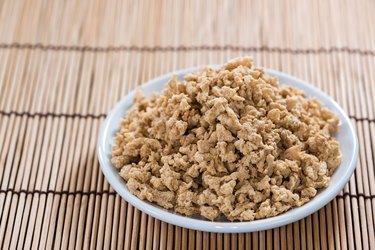
There is some debate regarding the role of soy protein in constipation. Soy protein is being researched for beneficial effects on cardiovascular health, insulin resistance and carbohydrate and lipid metabolism. Large doses of soy protein can cause constipation or make it worse in some people. If you have a constipation problem, talk to your physician before supplementing your diet with soy protein supplements.
Definition
Video of the Day
Constipation means hard bowel movements. You cannot poop easily because your stool is hard and dry. It occurs when the colon absorbs as much liquid from the stool to make it hard. People with constipation should drink plenty of liquids. Other factors that can lead to constipation include stress, dehydration and inactivity.
Video of the Day
Soy Protein and Constipation
Constipation is often caused by a low-fiber diet and dehydration. Consuming soy protein in excess of your body's needs may cause dehydration, notes Barry A. Franklin, Ph.D., co-author of 101 Frequently Asked Questions About "Health & Fitness " and "Nutrition & Weight Control." High protein content of soy also makes the complex carbohydrate difficult to absorb. Because complex carbohydrates in a variety of edible plants help alleviate symptoms of constipation, consuming excessive amounts of soy protein puts you at risk for this disease.
Prevention
Most cases of constipation are not serious or lasting. Increasing dietary intake of fiber to 25 g to 30 g a day may help reduce your constipation. Fiber softens the stool, allowing the stool to pass through the colon more quickly. Drink plenty of fluids, especially water, to reap the benefits of fiber.
Considerations
Soy protein has important health effects, which sometimes outweigh the harm. In a 2003 study published in "Nutrition Journal," obesity researchers noticed that soy protein is effective for losing weight as it controls the body's use of fat. (See References 4) Soy protein also helps prevent cardiovascular disease by lowering levels of LDL "bad" cholesterol and increasing the flexibility of blood vessels. Therefore, before you make any major adjustments to your eating plan, consult your doctor.